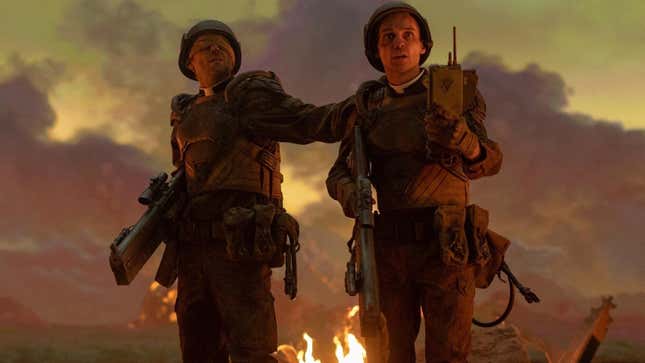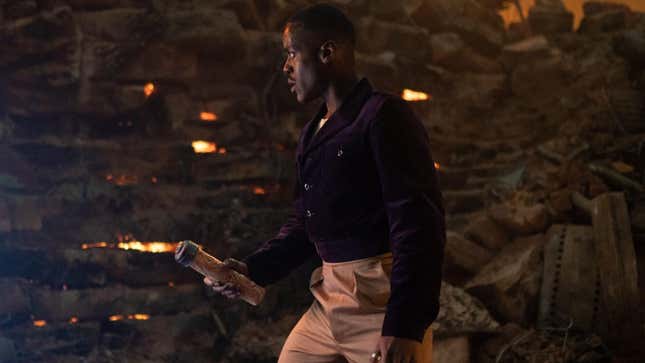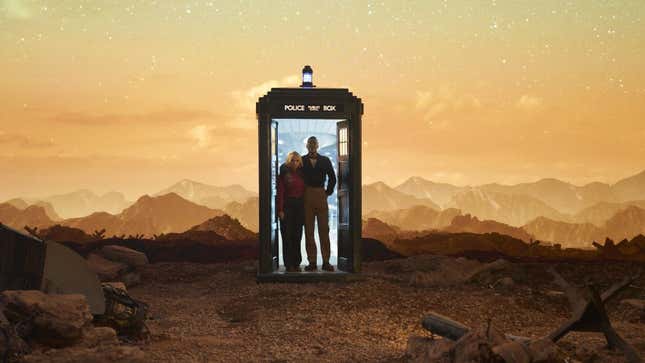There are a certain amount of expectations when you say the words “a Steven Moffat episode of Doctor Who.” Over his tenure as a regular writer and then as the series’ showrunner for the best part of seven years, Moffat developed a house style—to his detractors, a preponderance for questionable mysteries and twists, to his defenders, a penchant for tight, twisting thrillers, and a fairytale darkness. But if there’s one thing you can expect regardless when you say “a Steven Moffat episode of Doctor Who,” it’s something that just gets it.
“Boom” gets it.

Set on an alien battlefield in the far flung future, Moffat’s return to Doctor Who—in this new age of splashy Disney budgets, breakneck pacing and fantastical overtures, and high intensity, loud characterization—is a jolt to the series’ system after last week’s busy, bustling, and charmingly messy double-premiere. Everything about “Boom,” named for the explosive device the Doctor unwittingly steps on about 15 minutes into the story, slams the brakes down. And that’s almost literally, since the Doctor cannot move for the vast majority of the episode lest the combination of the mine’s biological immolation protocols and his own explosive Time Lord DNA take out half the planet with him. This puts the Doctor and Ruby through an emotional wringer that commands incredible performances from Ncuti Gatwa and Millie Gibson alike, ones that really dig deep into who these heroes are more than the breezy besties of episodes one and two could, and despite the fact that they spend most of the proceedings stuck inside a dingy crater on an empty battlefield. Can you have a bottle episode if the bottle it takes place in is technically an open-air ditch? Doctor Who says “yes, and we’ll make it look great anyway.”

The battlefield our heroes find themselves trapped in one very specific part of is empty due to a war between the native inhabitants of Kastarion 3, and an invading army of battle-clerics on behalf of the Villengard Corporation. Villengard, an intergalactic weapons manufacturer, is an idea that has been littered throughout Moffat’s work—bookending his first and last episodes of his prior tenure, from being mentioned as the developer of Captain Jack Harkness’ sonic blaster in “The Empty Child” and “The Doctor Dances” to being a planet actually visited by the Twelfth and First Doctors in his final story as showrunner, “Twice Upon a Time”—but “Boom” is where the writer really gets to dive deep into this particular slice of his worldbuilding, delivering a biting satire of contemporary conflict and decision-by-algorithm capitalism in equal measure.
Everything happening on Kastarion 3 is given this diametric contrast that simmers beneath the actual tension of the episode—that the Doctor has his foot on a mine and needs to figure out a way to disarm it before he violently explodes—between the faith-driven tenets of the clerics, Anglican marines wearing priest collars and fighting holy wars, and what the Doctor repeatedly decries as the “Villengard Algorithm.” Invisible mines that turn your own body against you to save money on munitions, battle-ambulance-robots that trundle across the battlefield in search of patients—and then execute you if your treatment will take too long, because patients are more expensive than replacing bodies on the front line—everything about this conflict is dictated by the sing-song voice of AI facsimiles of human faces, even as actual people are murdered, by weapons or because the algorithm says so, and immediately transfigured into fleshy tube remains that are cost-efficient to carry back to base. As the Doctor puts it to Ruby at one point, barely containing his rage at the injustice of it all, to Villengard there is no human cost in these wars, only a fine line between spending enough money on supplying munitions to keep conflict going, and spending enough on the wounded left in the aftermath that the whole bloody mess remains viable to shareholders.

So as Ruby and the Doctor try to puzzle their way out of this deadly algorithm—with a little help from a few clerics and the AI facsimile of one of their fallen, John Francis Vater (guest star Joe Anderson)—what could counter such an unyielding, unfeeling threat like a company that chimes “thoughts and prayers” as it executes you and mulches your body down into a tube? Well… this is a Steven Moffat episode of Doctor Who. That doesn’t just mean twists and turns, or tense darkness, it means something else: that the answer in the face of such horror is, was, and always will be love.
A chance encounter with Vater’s daughter Splice (Caoilinn Springall) who’s come in search of her father on the battlefield with one of the battle-clerics—giving the Doctor and Ruby a heartwrenchingly bleak moment where they try to decide how best to tell a child in search of her dad that they’re holding his corpse as a counterbalance for an armed mine—sees this clash of human belief and machine logic manifest in multiple ways. At first there’s the tension of faith’s blinding attributes, as the Doctor begs cleric Mundy (Andor’s Varada Sethu—and more important here, the actress behind Doctor Who’s incoming companion making a surprise early appearance) to understand that the war she’s fighting is a meaningless slaughter for capitalism’s sake rather than her beliefs, as she tries to ascertain if the Doctor and Ruby are on their side or the—turns out, non-existent— Kastarions. But as tragedy strikes over and over as the countdown on the mine draws near—and the nearby ambulance-droids realize that someone has figured out the real nature of the war—Moffat pulls out a move that feels poetically akin to the climax of his very first Who story, the aforementioned “The Empty Child” and “The Doctor Dances.”

There, as is the case here, the love of a child overwhelms machine programming to save the day. Vater’s AI memorial is urged by the Doctor to raid Villengard’s algorithmic systems, connected through the Doctor’s own link to an ambulance-bot, and force a ceasefire that will terminate all munitions on the planet, begging that somewhere deep inside the recreation of Vater remembers that he’s a father who loves his daughter. It’s done with enough fuzzy logic, and sold to hell and back by a barnstorming, yet understated, performance from Gatwa, that like there, you are swept along with the cathartic release that this time, everybody gets to live (although not necessarily, Vater is still dead by the end of the episode, as are several other clerics, because it still wouldn’t be Steven Moffat writing without a few heartbreakingly sudden deaths to twist the knife). But it’s also a fittingly Doctor Who-y response to the context of this episode’s release, an age where we’re all increasingly worried about the role algorithms and artificial intelligence dictate our lives—and soon could dictate conflicts too—that the thing will save us is not a puzzle box twist, or matching logic with logic, but faith in our love for each other being able to transcend it all, whether it’s beyond death or beyond the digital future we’re heading towards.
And really, that’s “Boom” in a nutshell—an episode that plays with your expectation of twists and mysteries, of the kinds of needless complexity Moffat has thrived on in the past, to effectively deliver a simple, earnest message about human connection. In a season that is playing with the ideas of storytelling and metanarrative, it’s perhaps the twistiest take on that idea so far, indirectly playing with audience expectation the way it does instead of making that metanarrative an explicit part of the text. But in doing so, it reminds us of the power of what Doctor Who can do with storytelling when it’s firing on all cylinders: and that sometimes, all you need to get there is little faith and love, forged in the crucible of an absolute nightmare scenario, to get to the light at the end of the tunnel.
New Doctor Who episodes premiere Fridays at 7 p.m. ET on Disney+, and will broadcast through the BBC iPlayer at the same time in the UK, at 12 a.m. local time on Saturdays before broadcasting on BBC One later that day.
Want more io9 news? Check out when to expect the latest Marvel, Star Wars, and Star Trek releases, what’s next for the DC Universe on film and TV, and everything you need to know about the future of Doctor Who.




















+ There are no comments
Add yours